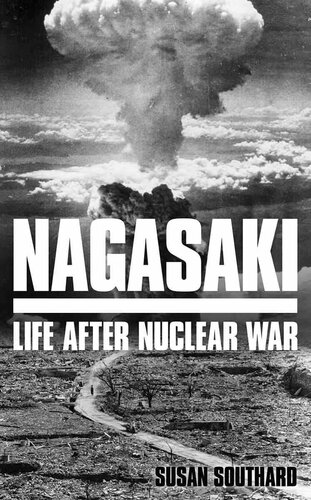

Most ebook files are in PDF format, so you can easily read them using various software such as Foxit Reader or directly on the Google Chrome browser.
Some ebook files are released by publishers in other formats such as .awz, .mobi, .epub, .fb2, etc. You may need to install specific software to read these formats on mobile/PC, such as Calibre.
Please read the tutorial at this link: https://ebookbell.com/faq
We offer FREE conversion to the popular formats you request; however, this may take some time. Therefore, right after payment, please email us, and we will try to provide the service as quickly as possible.
For some exceptional file formats or broken links (if any), please refrain from opening any disputes. Instead, email us first, and we will try to assist within a maximum of 6 hours.
EbookBell Team

4.1
70 reviewsOn August 9th, 1945, the US dropped an atomic bomb on Nagasaki.
It killed a third of the population instantly, and the survivors, or hibakusha, would be affected by the life-altering medical conditions caused by the radiation for the rest of their lives. They were also marked with the stigma of their exposure to radiation, and fears of the consequences for their children.
Nagasaki follows the previously unknown stories of five survivors and their families, from 1945 to the present day. It captures the full range of pain, fear, bravery and compassion unleashed by the destruction of a city.
Susan Southard has interviewed the hibakusha over many years and her intimate portraits of their lives show the consequences of nuclear war. Nagasaki tells the neglected story of life after nuclear war and will help shape public debate over one of the most controversial wartime acts in history.
Published for the 70th anniversary of the Hiroshima and Nagasaki bombs, this is the first study to be based on eye-witness accounts of Nagasaki in the style of John Hersey's Hiroshima.
On August 9th, 1945, three days after the atomic bombing of Hiroshima, a 5-tonne plutonium bomb was dropped on the small, coastal city of Nagasaki. The explosion destroyed factories, shops and homes and killed 74,000 people while injuring another 75,000. The two atomic bombs marked the end of a global war but for the tens of thousands of survivors it was the beginning of a new life marked with the stigma of being hibakusha (atomic bomb-affected people). Susan Southard has spent a decade interviewing and researching the lives of the hibakusha, raw, emotive eye-witness accounts, which reconstruct the days, months and years after the bombing, the isolation of their hospitalisation and recovery, the difficulty of re-entering daily life and the enduring impact of life as the only people in history who have lived through a nuclear attack and its aftermath. Following five teenage survivors from 1945 to the present day Southard unveils the lives they have led, their injuries in the annihilation of the bomb, the dozens of radiation-related cancers and illnesses they have suffered, the humiliating and frightening choices about marriage they were forced into as a result of their fears of the genetic diseases that may be passed through their families for generations to come. The power of Nagasaki lies in the detail of the survivors' stories, as deaths continued for decades because of the radiation contamination, which caused various forms of cancer. Intimate and compassionate, while being grounded in historical research Nagasaki reveals the censorship that kept the suffering endured by the hibakusha hidden around the world. For years after the bombings news reports and scientific research were censored by U.S. occupation forces and the U.S. government led an efficient campaign to justify the necessity and morality of dropping the bombs. As we pass the seventieth anniversary of the only atomic bomb attacks in history Susan Southard captures the full range of pain, fear, bravery and compassion unleashed by the destruction of a city. The personal stories of those who survived beneath the mushroom clouds will transform the abstract perception of nuclear war into a visceral human experience. Nagasaki tells the neglected story of life after nuclear war and will help shape public discussion and debate over one of the most controversial wartime acts in history.